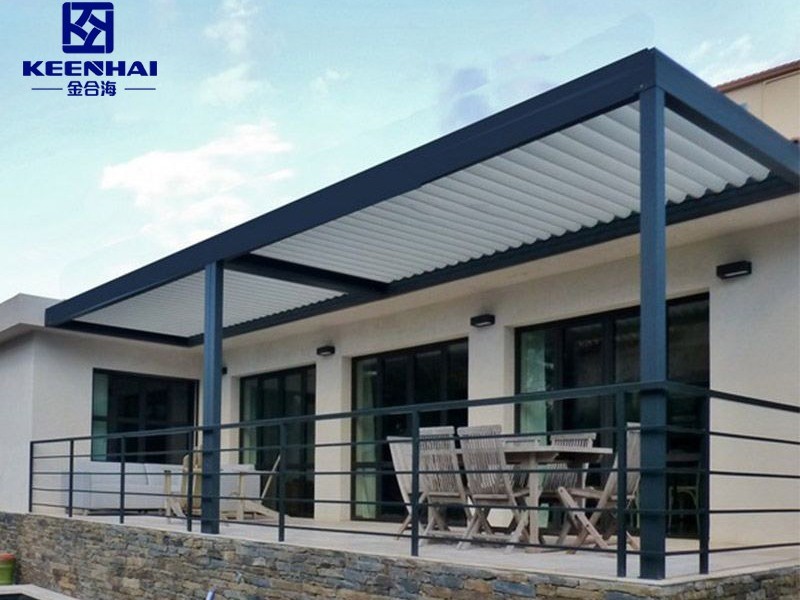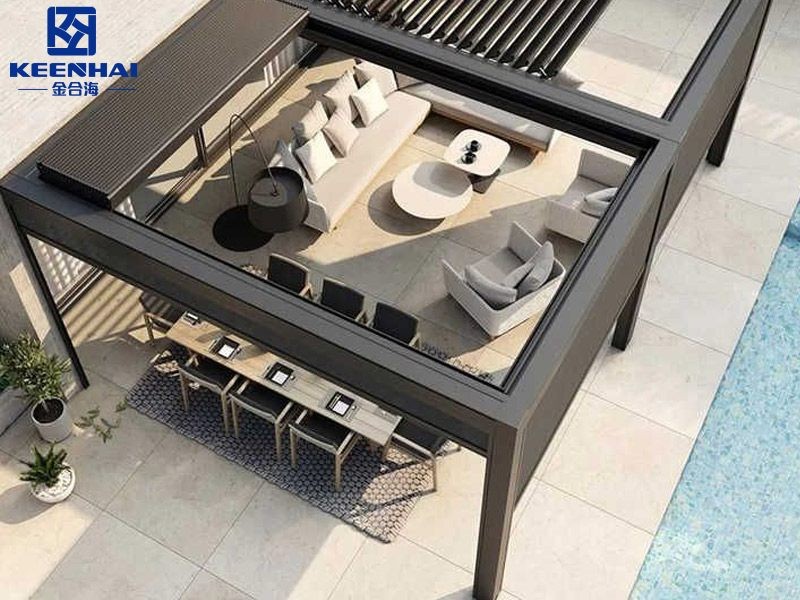
Cost vs. Value
Initial Investment and Installation Costs
When planning to install a high-quality bioclimatic pergola like this model, the first question that comes up is the upfront cost. On average, a premium aluminum structure ranges between $120 and $160 per square foot, depending on customization, louver mechanism type, and additional features such as LED lighting or integrated heaters.
-
Material Choice – Opting for an Aluminum Prefab Pergola ensures long-term resistance to rust and corrosion, which may slightly increase the initial price compared to wood but drastically reduces maintenance expenses over time.
-
Motorization vs. Manual – A motorized louver system can add between $2,500 and $5,000 to the total bill, but it significantly boosts convenience and daily usability.
-
Professional Installation – Hiring experienced contractors is non-negotiable for structural safety. Professional assembly for a mid-size 200 sq ft pergola typically costs $3,000–$5,000, including permits if required.
The table below outlines a typical cost breakdown for a 200 sq ft modern climate-control pergola:
| Item | Estimated Cost (USD) | Notes |
|---|---|---|
| Aluminum Frame & Louvers | $18,000 – $22,000 | Powder-coated for weather resistance |
| Motorized Adjustment System | $2,500 – $5,000 | Remote control or smart-home integration |
| Lighting & Heater Add-ons | $1,500 – $3,000 | LED strips, infrared heaters |
| Professional Installation | $3,000 – $5,000 | Includes permits & labor |
| Total Estimated Initial Investment | $25,000 – $35,000 | Varies by customization level |
By understanding these numbers upfront, homeowners can plan their investment without unpleasant surprises later in the process.
Long-Term Maintenance and Energy Savings
A louvered bioclimatic design stands out because it is built for minimal upkeep and long-term savings. Aluminum structures require only seasonal cleaning, while wooden models demand yearly sealing or painting, which can cost $1,000 or more annually.
-
Durability Advantage – A well-built Aluminum Modern Gazebo can easily last 20–25 years with minimal repairs, while cheaper steel or wooden options may need significant replacements within 10 years.
-
Energy Efficiency – Adjustable louvers help regulate sunlight and airflow naturally, reducing reliance on air conditioning in summer by up to 30% and improving passive heating in winter. Over a decade, this could translate into $2,500–$4,000 in utility bill savings for a typical household.
-
Resale Value – According to a 2023 real estate survey, adding a premium outdoor structure like a Aluminum pergola house can increase property value by 8–12%, especially in regions with warm climates where outdoor living is a selling point.
When viewed over a 15-year span, the savings from reduced maintenance, lower energy bills, and increased resale value often exceed the original purchase price, making this an investment that pays for itself in tangible financial terms.

Functional Benefits
Adjustable Louvers for Sunlight and Shade Control
One of the most valuable features of a modern climate-control pergola is the ability to adjust the louvers in real time, giving you precise control over how much sunlight enters your outdoor space. Unlike fixed-roof structures, the louver system works on a pivot mechanism that allows angles from 0° to 140°, offering everything from full sunlight to complete shade.
-
Morning Comfort – By setting the louvers at a 30° tilt, you can filter in soft morning light without the harsh glare, making it perfect for breakfast outdoors.
-
Midday Heat Reduction – Tilting the blades to about 75° can block up to 90% of direct sunlight, helping maintain a cooler environment even during peak summer.
-
Winter Warmth – Fully opening the louvers in winter allows maximum sunlight penetration, raising the ambient temperature by 5–8°C in sunny conditions.
Premium models like the high-quality bioclimatic pergola also feature smart sensors that automatically adjust the louvers based on the sun’s position and outdoor temperature, which is especially beneficial for homeowners who want comfort without constant manual adjustments.
Weather Protection and Year-Round Usability
A well-built Aluminum Prefab Pergola is designed to handle more than just sunny days. Integrated sealing systems ensure that when the louvers are fully closed, rainwater is directed into hidden drainage channels, keeping the area beneath completely dry.
Key weather-related advantages include:
-
Rainproof Design – Closed louvers overlap tightly, and the built-in drainage channels redirect water away from seating or dining areas, preventing puddles.
-
Wind Resistance – A sturdy powder-coated aluminum frame can withstand gusts up to 75 mph, making it safe in most weather conditions.
-
Snow Load Capacity – In regions with light snow, structural engineering allows the roof to support up to 25 lbs per square foot, ensuring it remains functional even in winter.
-
All-Season Utility – By combining adjustable shading with protective sealing, these pergolas allow you to enjoy the outdoors year-round without worrying about weather disruptions.
A louvered bioclimatic design essentially transforms a patio or garden into a four-season living space, enhancing both lifestyle quality and property value.

Material and Build Quality
Common Materials Used (Aluminum, Wood, Steel)
When choosing a pergola, the material you select shapes both its look and how it performs over time. Aluminum stands out for being lightweight yet structurally strong, making it perfect for modern climate-control pergolas. It doesn’t rust, requires almost no maintenance, and supports advanced features like motorized louvers without putting excess strain on the frame.
Wood offers a warm, timeless charm, especially for traditional gardens or rustic patios. Hardwoods like teak or ipe can last decades if maintained well, but they need regular sealing or staining to protect against moisture, termites, and sun damage. Neglecting upkeep will lead to warping or cracking over time.
Steel, especially galvanized or stainless variants, delivers unmatched strength. It can hold heavier loads and withstand strong winds, but it’s heavier, trickier to install, and more prone to corrosion if protective coatings wear down. Powder coating or weather-resistant finishes are essential for long-term performance.
| Material | Weight | Maintenance Needs | Corrosion Resistance | Lifespan (Well Maintained) |
|---|---|---|---|---|
| Aluminum | Light | Low | Excellent | 20–30 years |
| Wood | Medium | High | Moderate | 10–25 years |
| Steel | Heavy | Moderate | Good with coating | 20–40 years |
Durability and Resistance to Harsh Weather
A pergola’s long-term value depends heavily on its ability to handle the elements. High-quality bioclimatic pergolas use powder-coated aluminum because the finish forms a strong barrier against UV rays, salty coastal air, and acid rain. This means the surface doesn’t fade, peel, or corrode even in extreme climates.
In snowy regions, the structure’s load-bearing capacity is critical. Many aluminum models are engineered to handle 25–35 lbs per square foot of snow without bending, while heavy-duty steel frames can manage even more. For rain protection, a louvered roof with precision-fit blades channels water into concealed drainage systems, keeping the area underneath dry during storms.
Wind performance matters as well. Tests show that well-engineered frames like those from keenhaipergola can withstand gusts of 60–75 mph, ensuring stability and safety for year-round use. Choosing a louvered bioclimatic design not only gives weather adaptability but also extends the life of the structure, making it a true long-term investment.
User Experience and Convenience
Remote and Smart Home Integration
Modern motorized pergolas aren’t just about shade—they’re about control at your fingertips. High-quality bioclimatic pergolas now often come with handheld remotes or smartphone apps that let you adjust louver angles in seconds. With smart home integration, you can connect your pergola to systems like Google Home or Alexa, giving you voice commands such as "Open louvers to 45 degrees" or "Close pergola for rain".
Some premium models even feature weather sensors. These can automatically tilt the louvers closed when rain starts, or open them slightly when wind speed increases to reduce pressure on the frame. For homeowners who already have smart lighting or automated blinds, adding a modern climate-control pergola fits naturally into the ecosystem, providing both style and convenience without extra clutter.
Noise Level, Speed, and Ease of Operation
When it comes to daily use, quiet performance matters. The best motorized systems operate at under 45 decibels—about the same as a quiet conversation—so you can enjoy your outdoor space without the hum of machinery. Low-noise motors not only improve comfort but also indicate a well-engineered mechanism with minimal internal friction.
Speed is another key factor. Most Aluminum Prefab Pergola designs can rotate louvers from fully open to fully closed in 15–20 seconds. This quick adjustment means you can react instantly to changes in weather without leaving your seat.
Ease of operation extends beyond the motor. A well-designed louvered system should have smooth motion, no jamming, and a simple interface—whether that’s a remote, app, or wall-mounted switch. In some high-end options, you can save your favorite louver positions as presets, making it even easier to get the perfect lighting and airflow every time.
